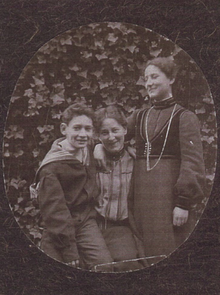Franz Landé
Franz Landé (born April 10, 1893 in Elberfeld (today a district of Wuppertal ); † September 30, 1942 in the Auschwitz concentration camp ) was a German musician and conductor . Among other things, he dealt with a reform of music theory teaching in schools.
family
Franz Landé was born in the German Empire as the third of four children into a liberal, open-minded, middle -class family of Jewish origin that was influenced by the understanding of socialism at the time , but had no religious ties. In addition to his work, the father took the time to help the children with their homework and to read books with them. Each family member mastered a musical instrument, which was used to organize house music evenings.
His father Hugo Landé (1859–1936) was a respected lawyer , judiciary and politically active social democrat . In 1909 he entered the Elberfeld city parliament for the first time as one of four social democrats. In 1919 he was parliamentary group leader of the SPD in the city council and regional president in Düsseldorf. His mother Thekla Landé (1864-1932) was also a member of the Social Democratic Party and, like her husband, became a city councilor in 1919. As the first female MP in the Rhineland, she focused on the welfare system and the education of girls and women.
His older brother Alfred (1888–1976) studied theoretical physics.
His younger sister Charlotte (1890–1977) began studying human medicine as an external student at the Remscheid Realgymnasium in the summer semester of 1909 after graduating from high school.
The youngest sister Eva (1901–1977) also did her Abitur as an external student at the Odenwald School and became a teacher, first at the reform pedagogical New School Hellerau in Dresden-Hellerau , later at an elementary school in Chemnitz . Since 1933 she lived in exile with her family.
Life
Franz Landé first studied law and economics. In Berlin, he also attended courses in music theory with Wilhelm Klatte and finally decided to focus on music.
He devoted himself to music theory and, in this context, at the time of the Weimar Republic was concerned with new approaches to reforming music theory in schools.
After the takeover of the Nazis emigrated Landé already in May 1933, first to his father in Geneva, and later over southern France to Paris. After spending time in various French internment camps, he was extradited to the German Reich in 1942, from where he was deported to the Auschwitz concentration camp in Poland on a freight train and murdered. He died on September 30, 1942.
Publications
- Franz Landé: "From folk song to atonal music: outline of a theory of living music". Carl Merseburger. Leipzig 1926 / Hofmeister 1952
- Franz Landé: “Work Resurrection”. Publisher of the German Workers' Singers Association Alexander Kaiser. Berlin 1928
- Franz Landé: “Reform of the music theory teaching” 1929
literature
- Elke Brychta, Anna-Maria Reinhold, Arno Meersmann: Courageous, argumentative, reformist. The Landés. Six biographies 1859–1977. Klartext-Verlagsgesellschaft, Essen 2004, ISBN 3-89861-273-2
Web links
Individual evidence
- ^ Herbert Champain: autobiographical tape recording with Charlotte Champain-Landé in Oberursel (Taunus), tape 1, 1977
- ↑ For Eva Landé see: Known members of the Association of German Teacher Emigrants: Eva Landé and Erich Stedeli
- ↑ Review: Elke Brychta, Anna-Maria Reinhold, Arno Meersmann: Courageous, arguable, reformist. The Landés. Six biographies 1859–1977. Klartext-Verlagsgesellschaft, Essen 2004, ISBN 3-89861-273-2 In: geschichte-gestalten.de , accessed on February 7, 2017.
- ^ Franz Landé (1893-1942). In: Geschichte im Wuppertal 2. (1993), p. 102
- ↑ Franz Landé In: gedenkbuch-wuppertal.de , accessed on 7 February 2017th
| personal data | |
|---|---|
| SURNAME | Landé, Franz |
| BRIEF DESCRIPTION | German musician |
| DATE OF BIRTH | April 10, 1893 |
| PLACE OF BIRTH | Elberfeld |
| DATE OF DEATH | September 30, 1942 |
| Place of death | Auschwitz |
